181 Search Results for asha
May 7, 2018
by Carole Zangari -
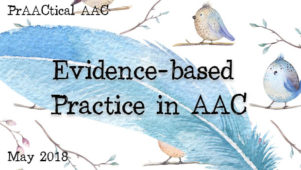
Dr. Jill Senner and Matthew Baud are staunch advocates for using research-based strategies and other evidence-based practices (EBP) in their AAC work. In today’s post. they share their thoughts on what EBP is, why it is important for AAC professionals, and how to incorporate it into our clinical and educational practices. :::::::::::::::::::::::::::::::::::::::::::::::::::::::::::::::::::::::::::::::::::::: Facts Matter: EBP in AAC Evidence-based practice (EBP) has been a buzz word in healthcare and education for almost two decades. However, “it has been well documented in many disciplines that major gaps exist between what is known as effective practices (i.e., theory and science) and what is actually done (i.e., policy and practice)” (Fixsen et al., 2005, p. 2). What is EBP, why is it important and how can we make sure we’re incorporating evidenced-based practices into our work with students and clients using AAC? Let’s take a look at answers to each of these questions below.... [Read More...]
May 3, 2018
by Carole Zangari -
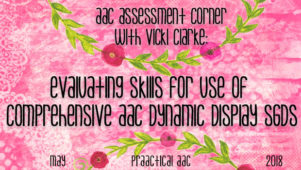
We’re always thrilled to share a guest post on AAC assessment practices from Vicki Clarke of Dynamic Therapy Associates. If you have questions about conducting AAC evaluations, read on. You can view her previous contributions to the AAC Assessment Corner here. :::::::::::::::::::::::::::::::::::::::::::::::::::::::::::::::::::::::::::::::::::: Evaluating Skills for Use of Comprehensive AAC Dynamic Display Systems Part I: Early Skills Over the past few years there has been an on-going discussion in the speech language pathology world about whether or not we needed to designate an official “specialty” recognition for augmentative and alternative communication practitioners. The argument goes something like this: It takes a lot of extra training, concerted effort in continuing education and daily practice in the assessment and implementation of augmentative communication to do it well. Therefore, we should have a “specialty area” in our national organization, ASHA, devoted to AAC. The counter-argument states that if our governing body says you need to... [Read More...]
April 2, 2018
by Carole Zangari -
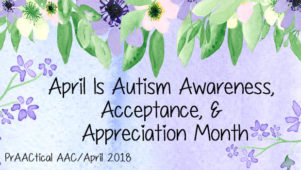
Happy World Autism Day! April has evolved from the original concept of raising awareness to include much more, but it still gives us an opportunity to learn, improve, and celebrate. Why learn more about working with people who have autism? There are lots of reasons, but here’s one for my fellow SLPs. If you are a school-based clinician, there is an excellent chance that you have these students on your caseload. According to the 2014 SLP Schools Survey Caseload Report, 90% of the school SLPs serve kids with ASD. Whether you are a teacher, therapist, family member, paraprofessional or just a curious person, understanding more about autism, especially from people WITH autism, will be an enriching experience. Whether you #LightItUpBlue or choose to #WalkInRed with #RedInstead, let’s renew our efforts to provide better communication supports to people with autism. Today, we share some ideas both for increasing our own understanding of... [Read More...]
December 9, 2017
by Carole Zangari -
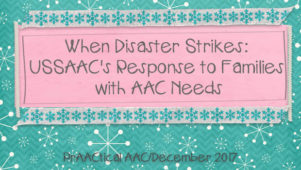
I’m honored to have AAC pioneer Dr. Sarah Blackstone join us today for a guest post that highlights the work that is being done by the US chapter of the International AAC Society (ISAAC). The US chapter, known as USSAAC, has a long-standing commitment to supporting the AAC community in times of national disaster. Dr. Blackstone is both a past president of ISAAC and a founding member of USSAAC. She has authored many AAC-related texts and articles and is a partner emerita of the Rehabilitation Engineering Research Center on Communication Enhancement. She has served the AAC community with distinction, having been granted honors and awards by ASHA, ISAAC, USSAAC, and other organizations. Dr. Blackstone previously practiced at Johns Hopkins Medical Center in Baltimore, and in a private practice that serving children with AAC needs. Currently, Dr. Blackstone is on USSAAC’s Board of Directors. She and Harvey Pressman co-chair USSAAC’s AAC Disaster... [Read More...]
November 9, 2017
by Carole Zangari -
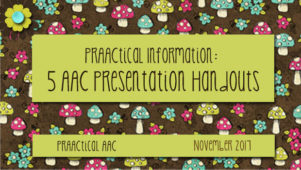
In a perfect world, we’d all be able to travel to conferences whenever we wished to soak up the AAC expertise from presenters around the world. Until then, we’ll keep posting links to handouts from conferences, workshops, and inservices with AAC content. Developing Language and Communication Power Usin a Core Vocabulary Classroom Approach by Gail Van Tatenhove Getting and Keeping AAC After High School Considerations for Transitioning Students who Use AAC Now, and Who Will Need AAC in the Future by Kathryn Helland AAC Strategies and Considerations for Children with Severe Speech Disorders: Not a Substitution, Just Part of the Solution by Erinn Fincke Life Before and After PECS: Reflections on Supports for Early Communication and Language by Cathy Binger Is the iPad the Best AAC Choice? by Nykki Montano
October 16, 2017
by Carole Zangari -
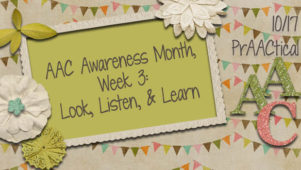
It’s not too late to celebrate the contributions of AAC or help build awareness of the field. In fact, we’re just getting started! If you are just joining this party, you might want to take a look at the resources in these posts. Week 1: Hands-on Activities Week 2: AAC Printables & Downloads In this third week, we’re turning inward and sharing ideas for how we can each grow our own skills for supporting people with AAC needs. Register for AAC-Everyone has a Voice! From Disability Rights NJ and ATAC Follow the USSAAC Webinar Series. On October 23rd at 7:00 p.m. ET Dr. Yoosun Chung will moderate a panel on Celebrating AAC Awareness Month. Podcasts are a great way to squeeze in some professional development, so consider listening to some AAC-related content while you exercise, drive, or just enjoy a cup of tea. Listen Up! AAC-related Podcasts Learn by Listening... [Read More...]
May 22, 2017
by Carole Zangari -
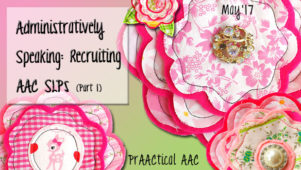
In a great many places, SLPs are in short supply. SLPs with specialized skills, such as those who can support students with AAC needs, are even harder to find. How can program administrators find, and, even more importantly, retain qualified SLPs? In this series, we share a few thoughts on the topic of space. One of the most meaningful things that an administrator is pretty simple: Ensure that the SLP has appropriate space in which to work. This basic requirement is frequently overlooked, particularly in educational settings. In schools, the SLP space is sometimes transient (e.g., M/W/F in the psychologist office, T/Th in the OT/PT area), inadequate (e.g., former book storage closet), or inappropriate (e.g., noisy environment, too small to hold groups). Sometimes, the space for SLP work is completely nonexistent. In the past few weeks, I’ve heard from SLPs who are expected to function without a dedicated workspace beyond... [Read More...]
May 1, 2017
by Carole Zangari -
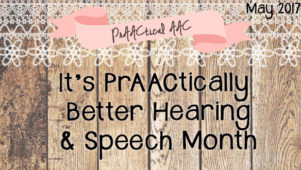
Here in the US, today is the start of Better Hearing and Speech Month (#BHSM).This year’s theme, Communication-The Key to Connection, has lots of prAACtical implications. The American Speech Language Hearing Association (ASHA) sponsors activities and shares resources every year, encouraging us to build awareness of communication and the professionals who serve those with speech, language, hearing, and swallowing disorders. For those of us interested in AAC, it’s also an opportunity to help our fellow professionals better understand the needs of people with complex communication needs. There are lots of ways that you can get involved to support AAC and spread the word about effective AAC practices to colleagues and families. Click on the image below to learn about what the ASHA is doing and to get a few ideas to get you started. Let’s make an impact.
January 12, 2017
by Carole Zangari -
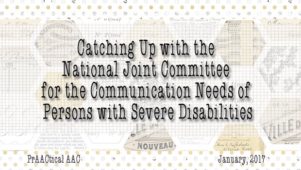
The NJC has been one of my go-to resources for many years, so I was delighted when Amy Goldman agreed to write an update on recent activities. Amy is one of my AAC heroes but you may know her best from her long career of advocacy with AAC and AT through professional organizations (e.g., ASHA, USSAAC, ATIA, PSHA, ATAP). Amy is now one of three technical assistance specialists with the national Assistive Technology Act Technical Assistance and Training Center (AT3). She recently retired from her position as Co-Executive Director of the Institute on Disabilities at Temple University, PA’s University Center of Excellence in Developmental Disabilities where she directed local, state, and federal projects related to assistive technology. She is honored to represent ASHA on the National Joint Committee for the Communication Needs of Persons with Severe Disabilities (NJC). She and I co-chair the ATIA strand on AAC and hope to see many... [Read More...]
December 5, 2016
by Carole Zangari -
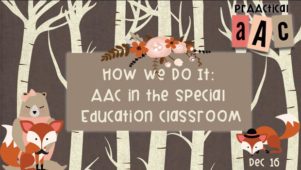
At the ASHA Convention last month, I chatted with an SLP about her secret longing: To take a sabbatical and travel the world to see AAC in action. Wouldn’t that be exciting?! In the meantime, we’ll have to live vicariously and peek into AAC practices through the words and pictures of dedicated professionals. Angi Pearce, a teacher at Kowhai Special School in Hastings, New Zealand, was kind enough to help us out and share her experiences in increasing AAC use in her classroom. Angi is the team leader for the Junior School classes (ages 5-11) and graciously prepared this post with support from SLP Michelle Roberts. As you’ll see, Angi is a highly experienced educator but new to the world of AAC and not afraid to take risks and embrace change. Let’s take a look at how a veteran teacher stretched herself to incorporate more AAC into her classroom. :::::::::::::::::::::::::::::::::::::::::::::::::::::::::::::::::::: AAC IN THE CLASSROOM My... [Read More...]









